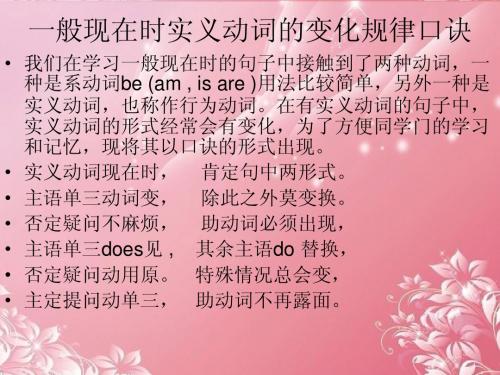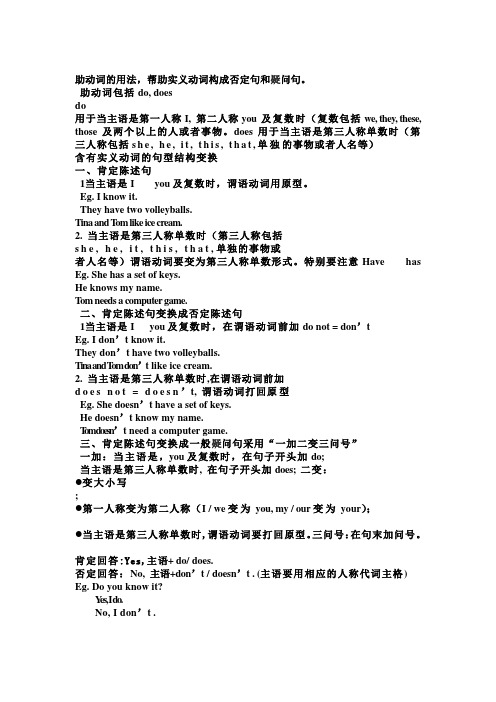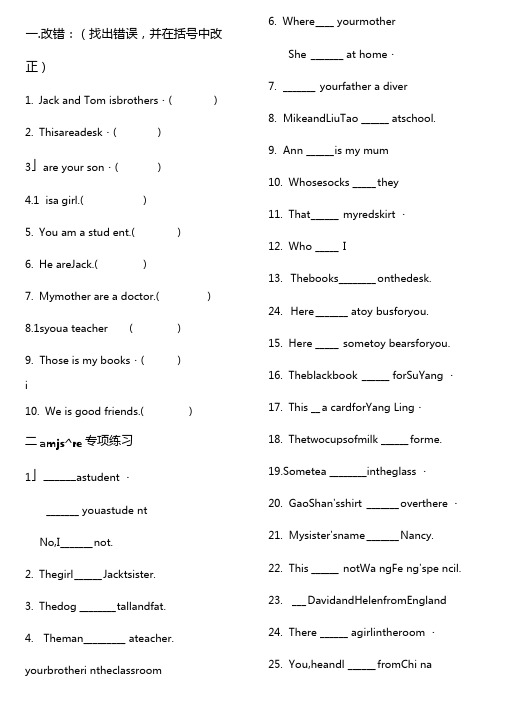实义动词的句型转
七上unit5含实义动词的句子怎样变否定句和一般一般疑问句

实义动词一般现在时的句型
句型形式 句型结构
例句
肯定句
主语+实义动词+… He likes English.
否定句
主语+don’t /
He doesn’t like
doesn’t +动词原形 English.
疑 一般疑 Do/Does+主语+ Does he like
问 问句 动词原形+…
English?
含实义动词的句子怎样变为否定句
1. He wants to go to Beijing. He does’ t want to go to Beijing.
2. Peter lives in Chongqing. Peter does’ t live in Chongqing.
3. Lucy knows about China. Lucy does’ t know about China.
5. Jane goes to school by bike. Does Jane go to school by bike? Yes, she does. / No, she doesn’ t.
6. Kangkang helps her study English. Does Kangkang help her study English? Yes, he does. / No, he doesn’ t.
wash---w__a_s_h_e_s fix---___fi_x_e_s__ go---__g_o__e_s__
play---__p_l_a_y_s_
study---_s_t_u_d_ie_ s carry---_c_a_r_r_ie_s
一般现在时动词变换规律

They don’t come from America Do you have an eraser ? • 特例:在对句子的主语或主语的定语进行提问时, 句子中不出现助动词,谓语动词用第三人称单数 形式。例如: Miss Zhang teaches us English.(对划线部分提问) Who teaches you English ? Who sits behind you ? Li Lei does • 重点语法相关练习: • 句型转换
具体解释如下: 1.动词发生变化。在一般现在时的肯定句中,若主语是第三 人称单数,实义动词要发生变化,简称:肯定句,主 单三,动词变。(特殊注意:若主语不是第三人称单 数时,实义动词则不发生变化。) My mother often makes cakes for us They speak English every day We go to school by bike every day 2.要出现助动词。在一般现在时的否定句或疑问句中要出现 助动词do或does。若主语是第三人称单数,助动词用 does;若主语不是第三人称单数,助动词用do。 (特殊注意(1).在一般疑问句中,助动词要放在句首。 (2).在否定句中,助动词要放在主语的后面,实义动词的前 面。
• • •
• •
We don’t have classes on Sunday Does he like swimming ? 3. 动词要用原形。在一般现在时的否定 句或疑问句子中,无论主语是第几人称, 单数还是复数,实义动词都用原形。 Han Mei doesn’t like milk at all Does he speak English ?
• •
•
•
3. Jack studies English very hard .(改 为否定句) doesn’t study Jack ______ ______ English very hard . 4. Kate lives on a farm (就画线部分提 问) does Where live _____ ______ Kate ______ ?
实义动词的词形变化

实义动词的词形变化一.原形(do)1.一般现在时(用于非单数第三人称)例如 We know him.2.情态动词后例如 I can swim.3.助动词后例如 She doesn’t like swimming.Does she like eggs ?4.祈使句首例如 Stand up ,please.5.固定句型例如 Let me watch TV.二.单数第三人称(does)1.一般现在时。
(he ,she ,it 或它们代替的词)例如 He has a cat .She enjoys watching TV.I t often rains .This desk has four legs .2.表示猜测Who knows the answer ?三.不定式(to do)1句型want to do sthwould like to do sthdecide to do sthit is time to do sthask sb to do sthtell sb to do sth2两个动作之间例如 I can come to see you.四.现在分词(doing)用于现在进行时中例如 She is watching TV.五.动名词(doing)1.标题:Unite 8 Playing games.2.作主语:Running is good for you.3.介词后:I want some water after running.4.固定句型:She enjoys watching TV.。
助动词的用法,帮助实义动词构成否定句和疑问句

助动词的用法,帮助实义动词构成否定句和疑问句。
助动词包括do, doesdo用于当主语是第一人称I, 第二人称you 及复数时(复数包括we, they, these, those及两个以上的人或者事物。
does 用于当主语是第三人称单数时(第三人称包括s h e,h e,i t,t h i s,t h a t,单独的事物或者人名等)含有实义动词的句型结构变换一、肯定陈述句1当主语是I you及复数时,谓语动词用原型。
Eg. I know it.They have two volleyballs.Tina and T om like ice cream.2. 当主语是第三人称单数时(第三人称包括s h e,h e,i t,t h i s,t h a t,单独的事物或者人名等)谓语动词要变为第三人称单数形式。
特别要注意Have has Eg. She has a set of keys.He knows my name.T om needs a computer game.二、肯定陈述句变换成否定陈述句1当主语是I you及复数时,在谓语动词前加do not = don’tEg. I don’t know it.They don’t have two volleyballs.Tina and T om don’t like ice cream.2. 当主语是第三人称单数时,在谓语动词前加d oe s n o t=d o e s n’t, 谓语动词打回原型Eg. She doesn’t have a set of keys.He doesn’t know my name.T o m d o e s n’t need a computer game.三、肯定陈述句变换成一般疑问句采用“一加二变三问号”一加:当主语是,you及复数时,在句子开头加do;当主语是第三人称单数时, 在句子开头加does; 二变:●变大小写;●第一人称变为第二人称(I / we变为you, my / our变为your);●当主语是第三人称单数时,谓语动词要打回原型。
be动词和实义动词的句型转换练习

be动词和实义动词的句型转换练习一.改错:(找出错误,并在括号中改正)1.JackandTomibrother.()2.Thiareadek.()3.Iareyouron.()4.Iiagirl.()5.Youamatudent.()6.HeareJack.()7.Mymotherareadoctor.()8.Iyouateacher()9.Thoeimybook.()10.Weigoodfriend.()二am,i,are专项练习1.I______atudent.______youatudentNo,I_____not.2.Thegirl______Jack'iter.3.Thedog_______tallandfat.4.Theman_______ateacher.6.Where_____yourmotherShe______athome.7._______yourfatheradiver8.MikeandLiuTao______atchool.9.Ann______imymum10.Whoeock______they11.That______myredkirt.12.Who______I13.Thebook______onthedek.14.Here______atoybuforyou.15.Here______ometoybearforyou.16.Theblackbook______forSuYang.17.Thi___acardforYangLing.18.Thetwocupofmilk_____forme.19.Sometea______inthegla.20.GaoShan'hirt_______overthere.21.Myiter'name______Nancy.22.Thi______notWangFang'pencil.23.____DavidandHelenfromEngland25.You,heandI______fromChina.26.Lily______ieatinganegg.27.Thi______myfamilyphoto.28.TomandI______goodfriend.29.Thoe______herkey.Thi______mykey.30.Whatcolor______yourbook31.Where______hipencil?32.What______yourname33.Thatphoto______onthedek.34.Hipen____red.35._____LinTaoandJimboy36.I______anEnglihteachernow.37.HelenandNancy______goodfriend.38.I________fromAutralia.39.She_______atudent.40.JaneandTom_________myfriend.41.Myparent______verybuyeveryday.42.A:Where_______theoffice?B:It________behindthebuilding.43.A:_______youMiBlack?B:Ye,I______.44.It_____ahirt,it_______(not)akirt.45.Thelittledog_____mymum'dog46.She_______(be)myfriend.47.Lily_______(have)twogoodfriend.48.Thi_______(be)ablackcat.49.Everydaywe_______(read)Englih.50.Thepen_______(inot)red.51.How_______(be)you52.What____theweatherliketoday(be)53.Who_______(be)they54.Who_______(be)I55.Myfriend______(like)readingbook.56.Thewindow_______(be)inthewall.57.I_______(like)baketball.58.Twoboy_______(be)intheroom.59.What_______(be)yourfamilyname60.Who_______(be)hermother61.Where_______(be)thecat62.Where_______(be)hipen63.How_______(be)yourfather64.Mymother_____(like)watchingTV65.He_______(wantnot)toeatbreakfat.三.仿照例句改写下列句子。
be动词和实义动词的句型转换练习测试

7. She is my good friend.
否定: _________________________________
11. They like playing basketball.
52. What ______ the weather like today(be)
48. This ________ (be) a black cat.
49・ Everyday we _________(read) English.
50. The pen _________ (is not) red.
一.改错:(找出错误,并在括号中改
正)
1. Jack and Tom isbrothers・(
)
2. Thisareadesk・(
)
3」are your son・(
)
4.1 isa girl.(
)
5. You am a stud ent.(
)
6. He areJack.(
)
7. Mymother are a doctor.(
)
8.1syoua teacher (
)
9. Those is my books・(
)
i
10. We is good friends.(
)
二 amjs^re 专项练习
1」______astudent ・
_______ youastude nt
No,I_______ not.
2. Thegirl ______ Jacktsister.
小学英语基本句子结构与句型转换
(一)实义动词〔词组〕+ 其它。
如:①We go to school on Monday.〔我们星期一上学。
〕②He reads a book in the morning.〔他早上读书。
〕③It starts at three o’clock.〔它3点钟开场。
〕需要注意的是,当主语是第一人称〔I,We〕,第二人称〔You〕,第三人称复数〔They,Ann and Ken等〕时,谓语动词用原形;但当主语是第三人称单数〔He,She,It,Ken,Mocky等〕②③〕。
(二)一起构成谓语,表示主语的个性、主语+ be + 表语〔形容词、名词组、介词组等〕+ 其它。
如:④I am tall.〔我是高的。
〕⑤Allen is late for dinner. 〔Allen晚饭迟到了。
〕⑥You are a good student. 〔你是一个好学生。
〕⑦Today is Monday. 〔今天是星期一。
〕⑧The bird is on 〔这只鸟在岩石上。
〕(三)主语+ can + 动词原形〔词组〕+ 其它。
如:⑨We can play with you on Sunday.〔星期日我们能与你玩。
〕⑩Uncle Booky can help you.〔Booky大叔可以帮你。
〕(四)陈述句变一般疑问句:一般疑问句是疑问句的一种,意为“谁……吗?〞,通常用Yes或No 来答复,其根本句子构造:助词do/系动词be/情态动词can + 主语+ 其它?(1)实义动词作谓语的陈述句变一般疑问句时,要凭借助词Do或Does 来完成,方法是在主语前加助词Do或Does,主语后一律用动词原形,句尾变为“?〞即可。
其答语为:Yes,主语+ do/does。
或No,主语+ don’t/doesn’t。
需要注意的是,主语是第一人称、第二人称、第三人称复数时,与助词Do搭配;主语是第三人称单数时,与助词Does搭配〔助词do的第三人称单数形式是does〕。
初中八种重要时态常用的时间状语
初中八种重要时态常用的时间状语一、The Present Indefinite Tense(一般现在时)(一)句型转换。
1、含be动词的句型转换肯定句:S2+is+.../I+am+.../S1+are+...否定句:S2+is + not +.../I+ am +not+.../S1 +are +not+...一般疑问句:Is +S2+...?肯定回答:Yes,he/she/it is.否定回答:No,he/she/it isn't.Am+I/Are+you+...?肯定回答:Yes,I am./否定回答:No,I'm not.Are +S1+...?肯定回答:Yes, we/you/they are.否定回答:No,we/you/they aren't.2、含实意动词do的句型转换肯定句:S2 +does.../S1+ do...否定句:S2+doesn't +do+.../S1+don't + do+...一般疑问句:Does+S2+do+...?肯定回答:Yes,he/she/it does. 否定回答:No,he/she/it doesn'tDo +S1+do+...?肯定回答:Yes,I/we/you/they do./否定回答:No,I/we/you/they don't.3、含实意动词V的句型转换肯定句:S2 +Ves.../S1+ V...否定句:S2+doesn't +V+.../S1+don't + V+...一般疑问句:Does+S2+V+...?肯定回答:Yes,he/she/it does. 否定回答:No,he/she/it doesn'tDo +S1+V+...?肯定回答:Yes,I/we/you/they do./否定回答:No,I/we/you/they don't.4、含there be动词的句型转换肯定句:There is...There are否定句:There is not...There are not...一般疑问句:Is there ...?肯定回答:Yes,there is.否定回答:No,there isn'tAre there ...?肯定回答:Yes,there are.否定回答:No,there aren't.注意:肯定句改为一般疑问句时:①I/we/me/us→you,my/our→your,mine/ours→yours),三人称不变), ②改be 动词的am为are,改句号为问号),③改相应的词(some→any,and→or,very much/a lot/a little→at all)(S1第一类主语):除三人称单数外的代词I/you/we/they相当于we/you/they的专有名词(Lucy and I(we), you an Lily(you),Lucy and Lily(they)和相当于they的复数名词(these boys/men/birds等时,在一般现在时,动词用原形(S2第二类主语):三人称单数代词he/she/it,相当于he/she/it的单个人名/地名Lucy(she),Jim(he) China(it)及相当于he/she/it的名词this boy(he)that girl (she) the cat(it)等,在一般现在时中,动词用三单现。
实义动词的句型转课件
主语+had not been+动词ing
一般疑问句
Had+主语 been+动词ing
04
实义动词句型转换练习
填空练习
总结词
帮助学生掌握实义动词的时态和语态 变化
详细描述
设计一些填空题,要求学生根据上下 文填写正确的实义动词形式,包括现 在时、过去时、将来时等时态,以及 主动语态和被动语态的变化
动词的时态包括现在时、过去时、将来时等,表示动作发生 的时间和方式,例如“I eat an apple now”、“He will go to the park tomorrow”。
动词的及物性与不及物性
及物动词是指需要宾语来完整意义的动词,例如“I like music”;不及物动词是指不需要宾语来完 整意义的动词,例如“The bus arrived”。
实义动词通常分为及物动词和不及物动词两类,及物动词需要宾语来完整意义, 例如“write a letter”;不及物动词不需要宾语来完整意义,例如“jump into the pool”。
动词的语态与时态
动词的语态分为主动语态和被动语态,主动语态表示主语是 动作的执行者,例如“I write a letter”;被动语态表示主语 是动作的承受者,例如“The letter is written by me”。
肯定句
主语+have/has+been+ 动词ing
否定句
主语 +have/has+not+been+ 动词ing
现在完成进行时与过去完成进行时之间的转换
一般疑问句
Have/Has+主语+been+动词ing
实义动词的句型转换
对划线部分提问=特殊疑问词+一般疑问句语序
6.She bought some apples.(对划线部分提问) ______ ______ she ______?
7.The food was delicious.(对划线部分提问) ______ ______ the food?
didn't
句型转换练习
1.We are having an English class. 变为一般疑问句: Are you having an English class? 变为否定句: We are not having an English class. We aren't having an English class.
2.There were too many people here. 变为一般疑问句: Were there too many people here? 变为否定句: There were not too many people here. There weren't too many peopn/be提在前; 谓语若为实义动词,do/does句首用。
did
2.变否定,更容易,can/be 后not 别忘记; 谓 语 若 为 实 义 动 词 , 借 d o n' t / d o e s n' t 用 用 。
didn't
don't/doesn't 用了特小气,定记三单形式还为原。
3.Kangkang has short brown hair. 变为一般疑问句: Does Kangkang have short hair? 变为否定句: Knagkang doesn't have short hair.
- 1、下载文档前请自行甄别文档内容的完整性,平台不提供额外的编辑、内容补充、找答案等附加服务。
- 2、"仅部分预览"的文档,不可在线预览部分如存在完整性等问题,可反馈申请退款(可完整预览的文档不适用该条件!)。
- 3、如文档侵犯您的权益,请联系客服反馈,我们会尽快为您处理(人工客服工作时间:9:00-18:30)。
肯:They play basketball. 1.找动词:play 2.确定主语:they 3.确定助动词:don’t
4.将助动词放在原句动词之前。 5.否定句:They don’t play basketball.
实义动词的句型转换
肯定句变否定句
肯:I play basketball.
1.找动词:play
2.确定主语:I 3.确定助动词:don’t
4.将助动词放在原句的动词之前。 5.否定句:I don’t play basketball.
肯:We play basketball.
1.找动词:play
2.确定主语:I
肯: She plays basketball.
1.找动词:plays--play 2.找助动词:does 3.将助动词放在句首,并且大写首字 母。 4.句末添上问号“?”
5.用动词原形换动词三单形式。 Does she play basketball?
肯: The boy plays basketball.
肯:She plays basketball.
1.找动词:plays --play 2.确定主语:she 3.确定助动词:doesn’t 4.将助动词放在原句动词原形之前。 5.用动词原形代替三单形式。
6.否定句:She doesn’t play basketball.
肯:He plays basketball. 1.找动词:plays--play 2.确定主语:he 3.确定助动词:doesn’t 4.将助动词放在原形动词之前。 5.用动词原形代替三单形式。
6.否定句:He doesn’t play basketball.
1.Daniel watches TV every evening. 2. We go to school every morning. 3. He speaks English very well. 4. I have many books. 5. We have four lessons. 6. Daniel watches TV every evening. 7. We go to school every morning. 8. I like taking photos in the park. 9. Simon and Daniel like going skating .
肯定句变一般疑问句
肯:I play basketball.
1.找动词:play 2.找助动词:do 3.将助动词放在句首,并且大写首字 母。 4.句末添上问号“?” 5.注意一二人称的转换。 Do you play basketball ?
肯: We play basketball.
1.找动词:play 2.找助动词:do
3.将助动词放在句首,并且大写首字 母。 4.句末添上问号“?” 5.注意一二人称的转换。 Do you play basketball ?
肯: They play basketball. 1.找动词:play 2.找助动词:do 3.将助动词放在句首,并且大写首字 母。 4.句末添上问号“?”
Do they play basketball?
1.找动词:plays--play 2.找助动词:does 3.将助动词放在句首,并且大写首字 母。 4.句末添上问号“?” 5.用动词原形换动词三单形式。 Does the boy play basketball?
1.I watch TV every day. 2. David has got a goal. 3. We have four lessons. 4. Tom does his homework at home. 5. We go to school every morning. 6. Amy likes playing computer games. 7. She likes milk. 8. Daniel watches TV every evening. 9. He speaks English very well.
